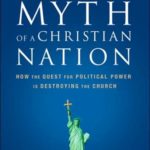We run our website the way we wished the whole internet worked: we provide high quality original content with no ads. We are funded solely by your direct support. Please consider supporting this project.

Watch Greg on CNN’s “God’s Warriors”
This video is a CNN.com video of Greg’s segment on God’s Warriors. Greg’s interview starts at 2:07.
The following was taken from a post on Greg’s blog (August 24, 2007):
Thoughts on “God’s Warriors” from “The Heretic”
Hi folks,
I and a bunch of friends just finished watching Christiane Amanpour’s CNN documentary entitled “God’s Christian Warriors.” I honestly thought the whole three-part series was simply fantastic. Each segment was well done, balanced, and over all enlightening. Mike Mocklar, the producer, and Christiane, along with the rest of their team, are to be commended.
On a personal note, I have to say that I found Christiane and her team to be a delight to work with. Christiane in particular was a joy to interview with. She’s just an honest, inquisitive human being who happens to be one of the world’s greatest reporters. Some might assume that a person with her notoriety might be a bit big on herself, but nothing could be further from the truth. Christiane is as real and humble as they come. This is probably why she’s so good at what she does. I feel honored to have been asked to be part of this enlightening documentary.
When I and my friends saw that the segment on me was entitled “The Heretic,” we laughed so hard we had to pause the documentary (fortunately, we had recorded it). Given all that had preceded this segment, we considered it a supreme compliment.
I felt the documentary captured the essence of my interview with Christiane. The team clearly wanted to sharply contrast my vision of the movement Jesus came to establish with the vision of “God’s Christian Warriors” who think Christianity is centrally concerned with winning political battles. They did this well.
Yet, some may have gotten the impression from the documentary that I think the Kingdom of God is only about having a personal relationship with Jesus. If you’ve read my book, The Myth of a Christian Nation, or if you’ve listened to any of my sermons, you know I have a much broader understanding of the Kingdom.
In my view, followers of Jesus are to be concerned with everything Jesus was concerned with – and Jesus was obviously concerned with more than people having a relationsip with himself.
Jesus was a revolutionary on social issues, so his followers are to be revolutionaries on social issues. Jesus entered into solidarity with the poor, so his followers are to enter into solidarity with the poor. Jesus revolted against racism by the countercultural way he treated and spoke about non-Jews , so his followers are to revolt against all forms of racism. Jesus revolted against classism by the way he embraced social and religious “rejects,” so his followers are to revolt against classism. Jesus revolted against sexism by the counter-cultural way he treated women — even women of ill-repute — so his followers are to revolt against sexism. Jesus revolted against legalistic religion that oppressed people, so his followers are to revolt against legalistic religion that oppresses people.
Jesus was a radical social activist, so his followers must be the same. It’s just that Jesus never once placed any trust in the government of his day to address social issues. He rather just addressed social issues by how he lived and taught. So too, we who are Jesus’ followers are to place no trust in government to address social issues. We’re simply called to address them by how we live.
Following Jesus’ example, we’re to place our trust in the power of the cross – the power of self-sacrificial love – not the power of the sword. We’re to trust the power of Calvary, not Caesar. And this is why I believe those who spend their time and energy trying to control the political arena “in Jesus’ name” are profoundly missing the point. Our job is to love, serve and sacrifice for sinners – not argue about passing laws against them. For we are to know that, whatever sin we see in others, our sin is much worse (Mt. 7:1-3).
Thank you Christiane, Mike, and the whole CNN team for giving me a chance to contrast the Jesus of the New Testament with the ugly, politicized Jesus of far too much of American Evangelicalism.
Keep his kingdom holy.
Greg
Related Reading

Hate-Filled Prayers
I came across a story about this billboard at 4:00 yesterday morning and tweeted on it. It would be easy to dismiss this sad display as an isolated act of a crazed fanatic, but I think it actually symbolizes the demonic animosity that permeates our current political climate. In fact, this is the third time…

Christians Should…
The American Jesus blog recently posted a series of reflections from Christians arguing for different ways of voting including, Barack Obama, Mitt Romney, Jill Stein, as well as an argument for not voting. It’s a little bit disturbing that each post is titled “Why Christians Should…” as this reflects the way we confuse our mission in the…

Praying for Peace During Political Hostility
Jesus calls his disciples to be “peacemakers” (Mt 5:9). During this season of political animosity, we have a great opportunity to practice being disciples by offering an alternative way of interacting with each other. One primary way we do this is by using the unique authority we have to affect the world through prayer to…

Remembering the Myth During Election Season
Given the current political furor in America right now, we thought we would post an extended quote from Greg’s book The Myth of a Christian Nation. This book was originally a reflection on Christian political engagement during the 2004 election, and how conflating “America” with Christianity is devastating to the mission we’ve been given in the…

Does religious faith make someone a better politician?
Question: A recent poll showed that a majority of Americans agreed with the statement: “Religious faith makes someone a better politician.” In fact, a majority said they would never vote for a candidate who had no religious faith. Do you agree that religious faith helps make someone a better politician? Answer: As a Christian pastor,…

